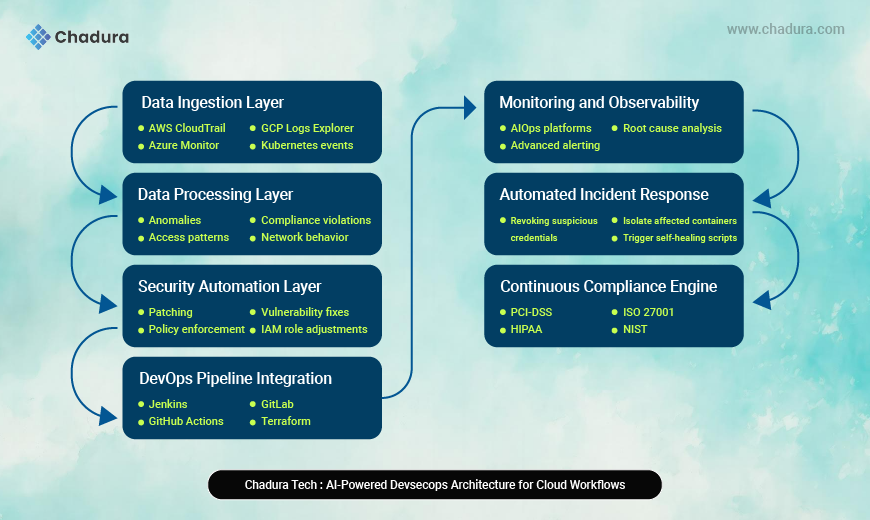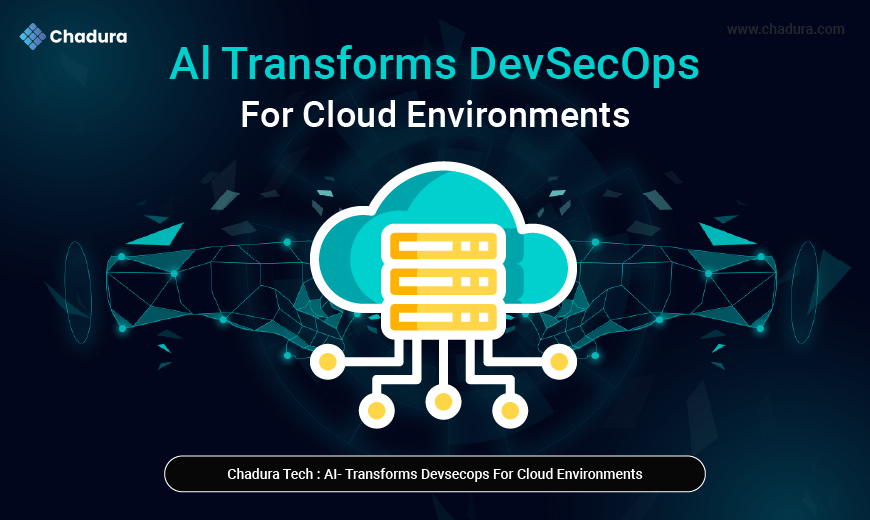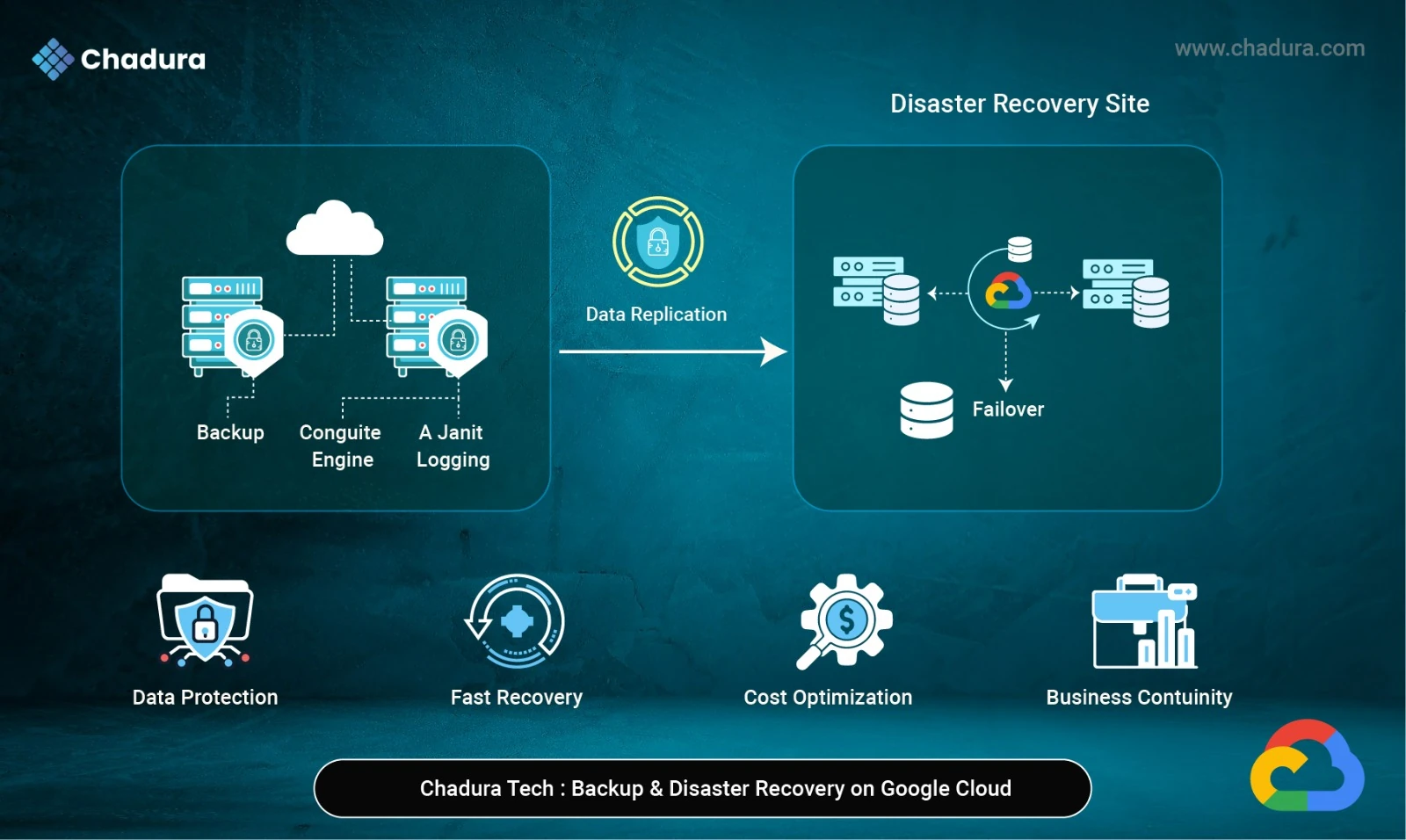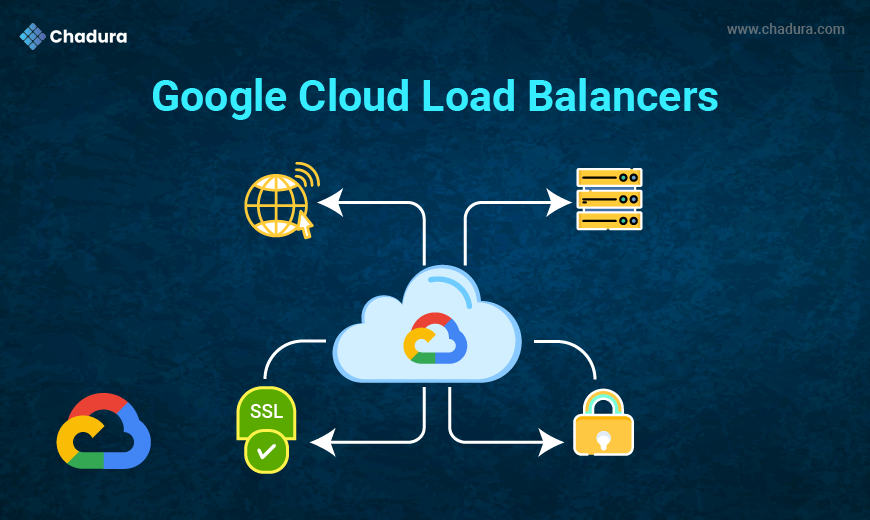Introduction
The speed at which cloud technologies, automation, and software development evolve has pushed organizations into a new era of continuous innovation. Modern applications—powered by containers, microservices, multi-cloud setups, and dynamic infrastructure—are deployed faster than ever before. However, with speed comes complexity, and with complexity comes risk. Cyber threats now evolve rapidly, targeting cloud workloads with unprecedented sophistication.
To maintain security in this ecosystem, companies rely on DevSecOps, an approach that integrates security practices into every phase of DevOps workflows. DevSecOps paved the way for proactive security, but the scale and speed of today’s cloud environments demand something more powerful—something capable of analyzing massive datasets, detecting hidden threats, and automating responses in milliseconds.
That “something” is Artificial Intelligence (AI).
AI has become the backbone of intelligent cloud operations, bringing unprecedented efficiency, security, and automation to DevSecOps workflows. Today, AI is not just improving DevSecOps—it is transforming it. Security is no longer limited to static rules; instead, AI makes it dynamic, self-learning, and predictive.
DevSecOps in Cloud Environments – A New Security Paradigm
What Is DevSecOps?
DevSecOps integrates security into development and operation cycles, ensuring that security becomes a shared responsibility—not a late-stage checkpoint.
It focuses on:
- Shifting security left (during development)
- Automating security controls
- Enforcing compliance throughout the pipeline
- Enabling continuous monitoring
- Responding to threats in real-time
For cloud environments, DevSecOps becomes even more crucial because cloud infrastructure changes constantly—new instances spin up, containers redeploy, roles change, and configurations evolve.
Why Cloud Environments Need Stronger DevSecOps
Cloud architecture introduces:
- Ephemeral resources
- Distributed microservices
- Multi-cloud integrations
- CI/CD-driven rapid releases
- High-volume log and event data
Traditional security tools cannot keep up with this pace. Human-driven monitoring is no longer enough.
This is exactly where AI becomes essential.
Why AI Is Becoming the Heart of DevSecOps
AI powers modern DevSecOps because it eliminates the limitations of manual security operations.
1. AI Makes Sense of Massive Cloud Data
Cloud environments produce enormous volumes of:
- Audit logs
- Container logs
- Firewalls logs
- API requests
- Identity activity
- Resource changes
AI systems analyze millions of data points instantly, learning patterns that humans would take months to identify.
2. AI Enhances Automation
AI automates critical tasks such as:
- Security scanning
- Threat alert filtering
- Configuration checks
- Policy enforcement
- Vulnerability triage
This reduces manual workload and eliminates human errors.
3. AI Enables Predictive Security
AI and machine learning forecast:
- vulnerabilities likely to be exploited
- configurations likely to fail
- user behaviors likely to be malicious
- systems likely to break compliance
Predictive security empowers teams to act before incidents occur.
4. AI Reduces False Positives
Security teams often drown in alerts.
AI improves accuracy by:
- correlating alerts
- scoring risks
- grouping related threats
- suppressing noise
This ensures teams spend time on real issues, not false alarms.
5. AI Enhances DevOps Speed Without Compromising Security
AI eliminates the friction between developers and security teams by providing:
- instant feedback
- automated reviews
- real-time vulnerability fixes
- intelligent pipeline approvals
This keeps pipelines fast and secure—perfect for cloud-native ecosystems.
Key AI Technologies Transforming DevSecOps
AI brings an entire suite of technologies that enhance cloud security.
1. Machine Learning (ML)
Machine learning helps systems learn from cloud data to:
- detect anomalies in user activity
- identify suspicious API calls
- predict vulnerabilities
- classify threats based on severity
ML models continuously improve as they learn more data.
2. Deep Learning (DL)
Deep learning identifies complex attack patterns that traditional rule-based systems miss:
- fraud attempts
- credential-based attacks
- malware in cloud traffic
- unusual container behaviors
3. Natural Language Processing (NLP)
NLP enhances DevSecOps by analyzing:
- log messages
- configuration files
- documentation
- threat reports
- misformed user requests
NLP also powers generative AI tools used to create automated policy recommendations and incident reports.
4. Reinforcement Learning (RL)
RL helps systems optimize decisions through trial and error.
Use cases include:
- dynamic firewall rule adjustment
- adaptive access controls
- intelligent alert routing
5. Generative AI (GenAI)
GenAI assists DevSecOps by automating:
- secure coding recommendations
- pipeline documentation
- incident postmortems
- policy creation
- security playbooks
This significantly boosts developer productivity.
AI-Powered DevSecOps Architecture for Cloud Workflows
A modern AI-integrated DevSecOps model consists of several layers:

The image illustrates a layered architecture of AI-powered DevSecOps for cloud workflows. It shows how AI is integrated into every stage of DevSecOps to enhance security, automation, and compliance across cloud environments.
The architecture is divided into seven key layers:
- Data Ingestion Layer – Collects raw data from cloud services like AWS CloudTrail, Azure Monitor, GCP logs, Kubernetes events, and CI/CD pipelines.
- Data Processing Layer – Uses AI to analyze anomalies, detect unusual access patterns, identify compliance issues, and monitor network behavior.
- Security Automation Layer – Automatically performs tasks such as patching, enforcing security policies, fixing vulnerabilities, and adjusting IAM roles.
- DevOps Pipeline Integration – Embeds AI into CI/CD tools like Jenkins, GitHub Actions, GitLab, Terraform, ArgoCD, and Helm to secure the deployment pipeline.
- Monitoring and Observability – AI aids in AIOps, advanced alerting, and root-cause analysis to improve system reliability.
- Automated Incident Response – AI quickly reacts to threats by revoking compromised credentials, isolating containers, triggering self-healing, and disabling risky resources.
- Continuous Compliance Engine – Ensures ongoing compliance with security standards like PCI-DSS, HIPAA, ISO 27001, NIST, and GDPR.
AI in Cloud Threat Detection
AI revolutionizes cloud threat detection by continuously analyzing massive amounts of logs, network traffic, and user behavior patterns. Instead of relying only on rule-based alerts, AI models detect subtle anomalies and suspicious activities that traditional tools often miss. This enables early identification of insider threats, privilege misuse, lateral movement, and abnormal API calls in real time. As a result, cloud environments become more resilient, with AI acting as an intelligent watchdog that learns from every incident and improves detection accuracy over time.
AI for Predictive Security in DevSecOps
Predictive security allows teams to stop attacks before they happen. AI models can analyze historical security data, identify patterns of misconfigurations, and forecast potential vulnerabilities. By predicting which areas of the cloud environment are most likely to be targeted, DevSecOps teams can address issues proactively. This reduces downtime, strengthens cloud defense posture, and enables continuous security improvement. AI-driven predictions ensure that security becomes anticipatory rather than reactive.
AI-Driven Automation in DevOps Pipelines
AI enhances DevOps pipelines by automating repetitive tasks like code scanning, testing, deployment verification, and configuration reviews. Machine learning models evaluate code quality, detect flaws, and even assist in generating secure configurations. AI also helps optimize CI/CD performance by predicting build failures and recommending fixes automatically. This leads to faster releases, reduced manual errors, and higher confidence in production deployments, ultimately making DevOps pipelines more intelligent and self-optimizing.
AI for Continuous Compliance
Cloud compliance is challenging due to dynamic infrastructure and frequent updates. AI simplifies this process by continuously monitoring configurations, access policies, and resource usage. It automatically maps activities against standards such as ISO 27001, HIPAA, PCI-DSS, and GDPR. When violations occur, AI can alert teams, generate reports, or even fix the issue through automated remediation. This real-time compliance enforcement ensures organizations stay audit-ready at all times without exhausting their security teams.
The Future of AI-Powered DevSecOps
The future of DevSecOps lies in autonomous security systems where AI makes decisions, enforces policies, and manages incidents with minimal human intervention. Emerging technologies like generative AI, large security models (LSMs), and AI-driven orchestration will reshape cloud security. DevOps pipelines will become fully self-healing, vulnerabilities will be resolved instantly, and threat detection will be predictive and automated. As AI matures, DevSecOps workflows will evolve into intelligent, adaptive, and continuously improving systems that secure cloud environments with unprecedented efficiency.
Conclusion
AI has become a critical enabler of modern DevSecOps in cloud environments. As organizations scale, automation, intelligence, and predictive capabilities become essential. AI makes cloud security adaptive, fast, and resilient, eliminating the limitations of manual processes. With AI, DevSecOps evolves into a powerful system capable of monitoring, analyzing, predicting, and remediating security issues across complex cloud infrastructures.
Organizations embracing AI-driven DevSecOps today will lead tomorrow’s digital world—faster, safer, and more innovative than ever.





